Exploring Anne Conway’s Spiritual Philosophy: A Lecture by Yining Wu
 Embark on a captivating journey into the depths of philosophy with Yining Wu’s upcoming lecture, “Anne Conway: What Does It Mean to Be Spiritual?”
Embark on a captivating journey into the depths of philosophy with Yining Wu’s upcoming lecture, “Anne Conway: What Does It Mean to Be Spiritual?”
Event Details:
- Date & Time: Thursday, March 6, 3:00–4:30 PM
- Location: IB 2050
Yining Wu, a Ph.D. candidate specializing in early modern philosophy, will delve into Anne Conway’s profound insights on spirituality.
It’s part of the Gender initiative because the renewed attention to Conway’s work is part of the movement to excavate the underappreciated role women have played in the history of philosophy
We look forward to your participation.
DKU Film Society Schedule|Pushing Boundaries: The Best of Cinema
 Join the DKU Film Society for a carefully curated series of screenings showcasing some of the most acclaimed films from renowned directors across different eras and genres. This semester’s lineup highlights a diverse selection of cinematic masterpieces that have left a lasting impact on the world of film.
Join the DKU Film Society for a carefully curated series of screenings showcasing some of the most acclaimed films from renowned directors across different eras and genres. This semester’s lineup highlights a diverse selection of cinematic masterpieces that have left a lasting impact on the world of film.
Convener: DKU Film Society
Time: Thursdays, 6:30 PM
Location: CCTE Theatre
Spring 2025 Screening Schedule
March 6 – Little Women (2019) – Dir. Greta Gerwig
A fresh and poignant adaptation of Louisa May Alcott’s classic novel, exploring the lives, struggles, and ambitions of the March sisters.
March 20 – I’m Not There (2007) – Dir. Todd Haynes
A unique, multi-actor portrayal of the enigmatic Bob Dylan, blending fact and fiction to explore the many facets of his identity.
March 27 – Do the Right Thing (1989) – Dir. Spike Lee
A powerful and visually striking film examining racial tensions in a Brooklyn neighborhood on a scorching summer day.
April 3 – Election (1999) – Dir. Johnnie To
A gripping Hong Kong crime thriller about power struggles within a triad organization, showcasing To’s signature tense and stylish direction.
April 10 – Taxi Driver (1976) – Dir. Martin Scorsese
A dark psychological drama following the descent of an alienated Vietnam War veteran into vigilante violence in a corrupt New York City.
April 17 – Underground (1995) – Dir. Emir Kusturica
An epic, surreal tragicomedy chronicling the turbulent history of Yugoslavia through the lives of two friends caught in the chaos of war.
April 24 – Fitzcarraldo (1982) – Dir. Werner Herzog
An audacious tale of obsession, following a dreamer’s impossible quest to build an opera house in the Amazon jungle.
May 1 – La Haine (1995) – Dir. Mathieu KassovitzA gripping social commentary on urban youth and police brutality, following three friends navigating life in the Parisian suburbs.All students and faculty are welcome! Whether you’re a film enthusiast or just looking to experience great cinema, join us for engaging discussions and an exploration of storytelling through film.
LCC 2025 Conference Report: Exploring Language and Culture
 On February 21, the Language and Culture Center (LCC) at Duke Kunshan University successfully hosted its inaugural conference “Think Globally, Act Locally: How We Engage Language and Culture”. The event attracted approximately 120 scholars, educators, and language teaching professionals from prestige institutions, including New York University Shanghai, Xi’an Jiaotong-Liverpool University, Wenzhou-Kean University, The Ohio State University, Beijing Foreign Studies University, Southeast University, City University of Hong Kong, and the University of Nottingham Ningbo China. Gathering in the Academic Building at Duke Kunshan University, participants engaged in a series of insightful lectures and in-depth discussions, collaboratively exploring innovative approaches and practical strategies in language education and intercultural communication.
On February 21, the Language and Culture Center (LCC) at Duke Kunshan University successfully hosted its inaugural conference “Think Globally, Act Locally: How We Engage Language and Culture”. The event attracted approximately 120 scholars, educators, and language teaching professionals from prestige institutions, including New York University Shanghai, Xi’an Jiaotong-Liverpool University, Wenzhou-Kean University, The Ohio State University, Beijing Foreign Studies University, Southeast University, City University of Hong Kong, and the University of Nottingham Ningbo China. Gathering in the Academic Building at Duke Kunshan University, participants engaged in a series of insightful lectures and in-depth discussions, collaboratively exploring innovative approaches and practical strategies in language education and intercultural communication.

Dr. Scott MacEachern, Vice Chancellor of Academic Affairs at Duke Kunshan University, delivered the opening remarks for the conference. He shared his valuable experience of learning 18 diverse languages during his archaeological research in northern Cameroon, West Africa, and highlighted the crucial role of language learning in shaping identity and fostering cultural recognition.
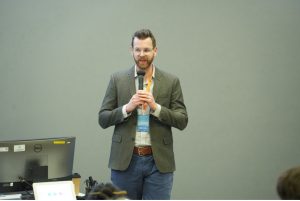
Dr. Francis Troyan, Professor of Multilingual Education at The Ohio State University, delivered an engaging keynote s
peech titled “Integrated Performance Assessment for Engaging Language and Culture.” He critically examined the limitations of current language proficiency assessments and shared insights on implementing integrated performance assessment in university language courses. His approach aims to comprehensively evaluate students’ deep understanding and practical application of both language and culture.
Dr. Don Snow, Professor and Senior Director of the Language and Culture Center, emphasized that the role of language educators goes beyond teaching vocabulary and grammar. More importantly, it involves helping students develop essential life skills, such as exploring the unknown, overcoming cultural and linguistic barriers, and collaborating effectively with people from diverse backgrounds.

Following the keynote speech, attendees joined eleven parallel sessions and an interactive poster session for lively discussions on a range of topics, including the impact of artificial intelligence on writing and learning, perspectives on teaching Chinese as a Second Language, approaches to intercultural communication, and innovations in language assessment. These in-depth and wide-ranging exchanges not only fostered academic dialogues in the field of language education but also provided valuable insights for advancing innovation and development in language teaching.

The conference was hosted by the Language and Culture Center, and generously sponsored by the DKU Humanities Research Center. It provided a platform for language educators from bothdomestic and international institutions to connect and collaboratively explore innovations and improvements in language education.
RAS Art Focus March 16 – China’s Arts and Aesthetics of the Past: Art, Display and Performance in Prehistoric China
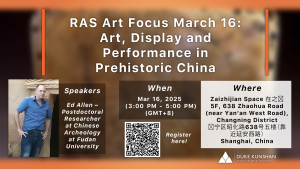
When
Mar 16, 2025
(3:00 PM - 5:00 PM) (GMT+8)
Curated and moderated by RAS Art Focus Convener and Art Historian Julie Chun, we continue our studies in the 2024-2025 series China’s Arts and Aesthetics of the Past as we delve into the material culture of the recent and distant history to assess how objects ranging from imperial patronage to utilitarian handicrafts have shaped China’s aesthetics through the ages.
Material records of art and display are a sure sign of human presence. This lecture by Ed Allen, Postdoctoral Researcher of Chinese Archeology at Fudan University, will take us back 30000 years, to China’s earliest known excavated adornments. We will follow this through the emergence of settled agriculture in the Chinese heartland, the rise of complex societies across China and emergence of the traditional Chinese state. We will examine how art, display and society variously intertwined across these separate phases. The lecture will serve as an introduction to the riches of archaeology in China and how archaeology can impact how we think about art and display even in the Instagram Era.
SPEAKERS

Ed Allen – Postdoctoral Researcher at Chinese Archeology at Fudan University
Register here.
Event Report — Female Pain in Pre-modern China/ Reading group night
By Yuqing Wang, Class of 2025 & Yuting Zeng, Class of 2026
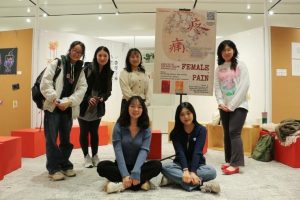
February 21, 2025, Professor Wenting Ji, Yuqing Wang and Yuting Zeng hosted a reading group sharing event centered on the theme of “female+pain,” guided by historian Dorothy Ko’s two monographs on women in Chinese history: Cinderella’s Sisters and Teachers in the Inner Chambers. This session attracts more than fifteen participants, including students and faculty members.
The event began with Yuting distributing handouts to initiate our discussion, setting the stage for an engaging conversation. Participants first reflected on pain as a personal and historical experience, questioning whether it can serve as a voice when words fail. This led to a nuanced discussion on footbinding, moving beyond its traditional portrayal as a symbol of oppression to examine its complex roles in cultural identity, social status, and gendered expectations. Yuqing then shifted the discussion to women’s education in premodern China, highlighting its dual nature as both a privilege and a tool of control. Professor Ji provided valuable insights into the gendered limitations of learning, from home-based instruction to moral conditioning. Participants engaged in a debate on whether education fosters liberation or reinforces confinement, drawing connections to modern-day gender norms.
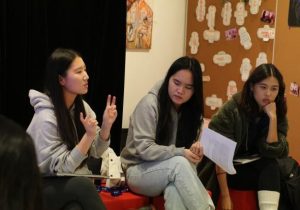 Our conversation expanded beyond historical analysis to address the multifaceted forms of pain experienced by women, past and present. Topics ranged from menstrual pain and its associated social stigma to the systematic exclusion of women from intellectual spaces. Participants drew parallels between historical silences and modern struggles for visibility and voice, prompting a deeper reflection on the enduring impact of pain—whether physical, social, or intellectual—on women’s lives.
Our conversation expanded beyond historical analysis to address the multifaceted forms of pain experienced by women, past and present. Topics ranged from menstrual pain and its associated social stigma to the systematic exclusion of women from intellectual spaces. Participants drew parallels between historical silences and modern struggles for visibility and voice, prompting a deeper reflection on the enduring impact of pain—whether physical, social, or intellectual—on women’s lives.

By the end of the session, participants left with a deeper understanding of the complexities surrounding women’s pain, both in historical contexts and contemporary society. The discussion fostered a critical examination of how pain has been used to define, constrain, and sometimes empower women, highlighting its role in shaping gendered experiences over time. Through engaged dialogue, attendees reflected on the evolving significance of footbinding, education, and exclusion, drawing connections between past struggles and present-day realities. The event not only encouraged meaningful scholarly exchange but also inspired participants to continue exploring these themes in their own research and daily lives.
Student Report: Translating feminism, gender movements, and beyond: Pathways to languages and traveling
Written by Xinyu Liao, class of 2027
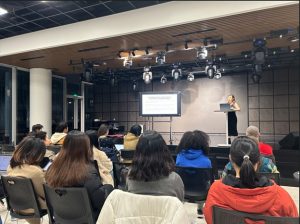
The event on February 19, 2025, featured Jenna Tang, a highly accomplished writer and literary translator from Taiwan, China. Ms. Tang holds an MFA in Fiction Creative Writing from The New School in New York City. Fluent in Mandarin, French, Spanish, and English, she has an extensive portfolio of translations and essays published in renowned platforms such as The Paris Review, Lit Hub, and Restless Books. Notably, she was the 2021 mentee at the ALTA Emerging Translators Mentorship program, focusing on Taiwanese prose, and her translation of Lin Yi-Han’s Fang Si-Chi’s First Love Paradise was released on May 21st, 2024. Ms. Tang has also translated works from authors in Taiwan, México, Bolivia, Colombia, Venezuela, and other regions.
The event kicked off with Ms. Tang sharing her journey to multilingualism. Growing up in Taiwan, she was exposed to multiple languages like Mandarin Chinese, Hakka, and Hokkien. Later, she mastered English, French, and Latin American Spanish through academic pursuits and international interactions. This multilingual foundation became the cornerstone of her translation career.
The path to literary translation was also a key topic. In the Chinese-speaking world, translated literature is common, fueling the Ms. Tang’s early love for languages. Starting as a subtitle and technical translator, she advanced with an MFA in Creative Writing and collaborations with various professionals. Traveling broadened her cultural and linguistic horizons, enriching her translation work.
A significant part of the event was dedicated to translating Fang Si-Chi’s First Love Paradise. Published in 2017 in Taiwan, this novel addresses sexual violence in the educational system. It led to legal changes and gained public attention, especially during the 2023 #MeToo movement in Taiwan. Ms. Tang also discussed the intricacies of translating feminist literature. It includes considerations when translating titles, dealing with Chinese characters, and being aware of cultural biases. Translating different elements like stream-of-consciousness and classical references requires careful thought and research. For those aiming to be translators, Ms. Tang gave practical advice. Reading widely, finding a meaningful book to translate, approaching authors and publishers, and building a community are all essential steps. Ms. Tang also introduced useful resources such as the American Literary Translators Association (ALTA) and related conferences.
In the Q&A session, participants asked about handling cultural nuances, conveying the author’s tone, and dealing with emotional content in translation. Ms. Tang provided insightful answers, emphasizing research, understanding the author, and using distractions to manage emotions. Overall, the event was a valuable exploration of literary translation. It inspired the audience with the speaker’s experiences and knowledge, highlighting the importance of multilingualism and cultural understanding in the translation process.
Join Us for an Engaging Talk with Paolo Visigalli

Location: 长乐路325号,近陕西南路 325 Changle Rd, Near Shaanxi South Rd,Shanghai, China
To register, please scan the QR code below.

Marco Polo and the Heresy of Evil: Meeting Yuan dynasty Fuzhou’s secretive religious group
Around 1290 CE, the famed Venetian merchant and adventurer Marco Polo was visiting the Southern Chinese province of Fujian. Only recentlyconquered by the Mongol army and a hotbed of frequent rebellion, this province’s countryside was infested with tigers and unidentified foxlike rodents, while its coastal cities, bustling hubs on the Maritime Silk Road, were among the most cosmopolitan places on earth. In one such city, Fuzhou, Marco and his uncle Maffio ran into what they emotionally identified as fellow Christians. But the Polos were almost certainly wrong. This mysterious religious group were most likely Manichaeans, the easternmost offshoot of a world religion founded by Mani, the third-century mystic from Sasanian Mesopotamia, the self-styled Apostle of Light.
This talk will closely examine this fascinating and unique episode describing the Polos’ encounter with the Fuzhou “Christians”. We will first consider it in relation to Marco’s book’s complex textual history. We will then explore how recent spectacular discoveries of textual and artistic Manichaean artefacts in Fujian shed new light on some salient aspects of Marco’s account. We will finally speculate about Marco’s reaction had he known the religious group he helped gain institutional support from the Mongol Court were not fellow Christians but distantly related coreligionists of the Cathars, Medieval Europe’s Heresy of Evil.
Speaker’s Bio:
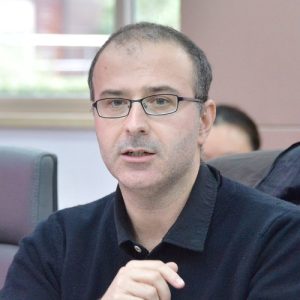 LI
LIAssociate Professor at Shanghai Normal University
Paolo Visigalli is Associate Professor at Shanghai Normal University (SHNU), Department of World History. His main area of research is Indian and Chinese Buddhism, with a burgeoning interest in Chinese Manichaeism. He holds a PhD in South Asian Studies from the University of Cambridge. Prior to joining SHNU within the framework of Thousand Talents Plan, he was a Postdoc at the University of Munich and the Max Plack Institute for the History of Science in Berlin, and taught Sanskrit and South Asian history at the School of Oriental and African Studies in London.
*** Members of the DKU community are invited to attend at a discounted rate of 60 RMB including one drink.
Come explore history and engage in thought-provoking discussions!
DKU Film Society Presents: The Best of Sofia Coppola
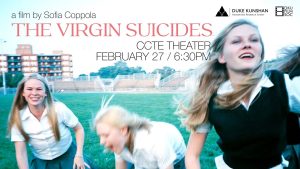
This Thursday at CCTE Theatre, we’re thrilled to present a screening of The Virgin Suicides (“处女之死,” 1999) as part of our “The Best of…” series. This hauntingly poetic debut by Sofia Coppola is a mesmerizing exploration of memory, desire, and the unknowable depths of adolescence.
Set in suburban 1970s America, The Virgin Suicides follows the tragic and mysterious lives of the five Lisbon sisters, whose beauty and isolation captivate the neighborhood boys who narrate the film. Through dreamlike visuals, an ethereal score by Air, and Coppola’s signature delicate touch, the film weaves a melancholic tapestry of youth, repression, and the fleeting nature of innocence.
Time & Location:
Information Session for Spring Conference 2025

Zoom Meeting ID: 647 602 0030
Password: HRC
If you’re a DKU or NYU Shanghai student interested in presenting your work at the conference, we invite you to attend our Information Session to learn more about the application process and what the event has to offer.
This session will provide all the information you need to apply to present your research, discuss potential topics, and explore other opportunities at the conference. Don’t miss out on this chance to contribute your voice to an important conversation in the field!
We look forward to seeing you there! If you have any questions, please feel free to reach out.
DKU Film Society Presents: 情书 Love Letter (1995)

Location: CCTE Theatre
Time: This Thursday, 6:30 PM
Tonight at CCTE Theatre, we’re excited to present a screening of Shunji Iwai’s Love Letter, as part of our “The Best of…” series. This emotionally evocative film is a masterpiece of modern Japanese cinema, renowned for its exquisite portrayal of love, grief, and the passage of time.
Set in the scenic beauty of Hokkaido, Love Letter follows the story of a woman who, after the death of her fiancé, uncovers a letter he wrote to her years earlier. As she delves into the past, the film explores themes of loss, memory, and the enduring power of love. With Iwai’s signature delicate style, Love Letter is a beautifully crafted meditation on human connection and the ways in which we cope with the loss of those we love.
Join Professor Davis and the Film Society in experiencing this beautiful film. Professor Davis will give a brief talk before the screening so please make sure to come early and grab a seat! Immerse yourself in this profound and visually stunning story of love and remembrance. See you there!